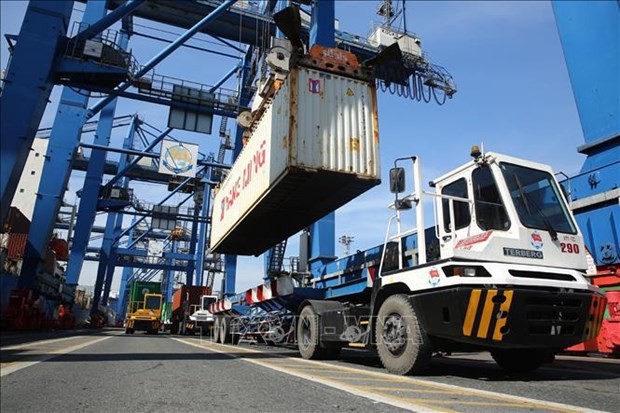
Bright prospect for Viet Nam’s export in 2022
Latest
 |
| Agriculture was the sector that brought "new impetus" to export growth in 2021. (Photo: VNA) |
According to the Vietnam Fruit and Vegetable Association (Vinafruit), many container trucks carrying bananas and dragon fruits have got customs clearance for export to China from February 3, or the third day of the Lunar New Year. This is good news for Viet Nam's fruit and vegetable industry in the context that just a few days ago, the Chinese side announced that it would have a long holiday and pandemic-related measures would be strictly applied, resulting in thousands of trucks carrying goods were stranded at border gates.
The resumption of agricultural exports to China brings great expectations for domestic enterprises. The reason is that China is currently the largest market for Viet Nam's fruit and vegetable industry. Last year, the export turnover of vegetables and fruit to China reached 1.9 billion USD, accounting for 53.7 percent of the country’s export market share.
Nguyen Thanh Binh, Chairman of the Vietnam Fruit and Vegetable Association, said that despite the large export volume, Viet Nam's vegetables and fruits are facing great challenges.
The amount of fruit and vegetable exports to China increased in volume in 2021. It decreased in value compared to the previous year, he said, adding that the requirements for food safety that China imposes on goods imported to this country are high. It is forecast that if the export growth rate is maintained, the fruit and vegetable export target of 3.8-4 billion USD can be realised this year.
Also on the first days of the Lunar New Year, the Trung An Hi-tech Agriculture Joint Stock Company announced that it has completed procedures to export 11,111 tonnes of brown rice to a partner from the Republic of Korea.
Regarding the textile and garment industry, the Hoa Tho Textile and Garment Joint Stock Corporation is reported to have a full order for production until the end of the second quarter of 2022.
As for the seafood industry, Truong Dinh Hoe, Secretary General of the Vietnam Association of Seafood Exporters and Producers (VASEP), said the fact that seafood exports in 2021 obtained a turnover of nearly 9 billion USD is considered a miracle given the negative impact of the COVID-19 pandemic.
According to Hoe, if businesses make good use of the world’s increasing demand to raise market share, and continue to promote processing of value-added products, Viet Nam's seafood this year will continue to make remarkable growth.
Statistics from the General Statistics Office, export turnover of goods was estimated to reach 29 billion USD in January, up 1.6 percent over the same period last year.
Nguyen Hong Dien, Minister of Industry and Trade, said that in 2021, the country’s import and export turnover hit a record of nearly 670 billion USD, of which exports made a spectacular breakthrough with an increase of over 19 percent. This is a milestone, a bright spot for the economy in the context of the complicated developments of the COVID-19 pandemic.
Last year, Viet Nam had 35 items seeing an export turnover of one billion USD, an increase of one item compared to 2020. Of these, there were eight items with export turnover of over 10 billion USD, he told Tien phong (Vanguard) newspaper.
Although accounting for less than 10 percent of the export value of the whole economy, agriculture was the sector that brought "new impetus" to export growth in 2021.
The minister attributed the results to good exploitation of foreign markets which brought Vietnamese goods deeper into the global production and supply chain.
“Vietnamese businesses have taken opportunities from free trade agreements, especially new-generation agreements such as CPTPP, EVFTA and UKVFTA", Dien said.
However, he said, there are still problems relating to import and export that should be dealt with. The export scale has increased, but added value is still low, he said, adding that many industries still export raw and semi-processed products. In particular, the proportion of enterprises with domestic investment in total exports is still low, Dien said.





















